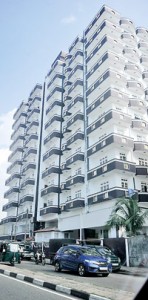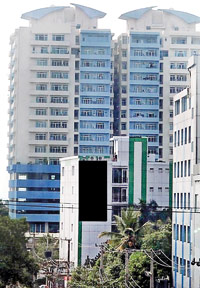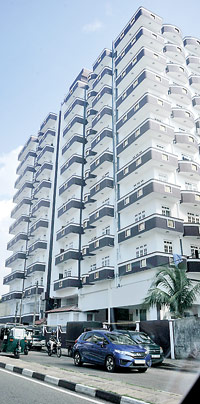News
Colombo apartments’ residents waiting in hope for their title deeds
The residents of Good Hope Apartments in Bambalapitiya have been waiting ten years for their title deeds. They are not the only ones.

Colombo City: Here an apartment block, there an apartment block. Pix by Amila Gamage
The owners of flats in 236 condominiums do not hold deeds to their properties. These buildings, a majority of them in Colombo, contain nearly 6,000 housing units and have not been certified by the Condominium Management Authority (CMA) for various reason.
In July, this newspaper wrote about the residents of Good Hope Apartments—many of them old and ailing—who are desperate to receive their deeds. Officials promised to work with the developer, Joseph Gunapalan Thiagarajah, to find a solution. “We will help him,” said J.D.N Chandrapala, Deputy General Manager (Regulatory).
“We will work on this”. But, four months later, little has changed. The Authority wrote to the residents, asking them to lodge a fresh complaint.
“We have complained so many times,” said Shyler Mendis, an airline pilot who lives at Good Hope Apartments. “They can’t even trace the letter we sent in 2009. So we sent them another, signed by a few owners.”
Captain Mendis said that Mr. Thiagarajah does not answer his e-mails, calls or messages. We telephoned the developer who insisted that he was not ignoring the problem. His initial transgression was that he had built a penthouse that was not in the approved plan.
He paid a penalty for it and also submitted a fresh blueprint. However, an objection has been raised again for which he has lodged an appeal with the Urban Development Authority (UDA) and was waiting for a response.
It was found that occupiers of a large number of condominiums built by the State did not have deeds. There were also 30 blocks of flats—3,517 units—constructed by NGOs for families displaced by the tsunami, still requiring CMA certification. At present, only 547 condominiums containing 24,021 housing units are CMA-certified, with deeds correctly issued to owners.
The Sunday Times was contacted by several other occupiers of flats who did not hold deeds. Among them was Ambika Satkunananthan, Member of the Human Rights Commission of Sri Lanka. Ms. Satkunanathan lives in the Landmaark Apartment Complex at 27, Rudra Mawatha, Colombo 6.
Owners of flats in that block have not received their deeds for eight years because the developer, T Nanthanan, has built two extra floors that were not in the approved plan. He is a “repeat offender”. He did the same in the case of two other apartment complexes, one on the same lane.
Mr. Nanthanan was slapped with a fine of around Rs. 14 million by the UDA. The residents intervened to get this reduced to Rs 9.4 million through a partial waiver of the interest.
Even after this, Mr. Nanthanan claimed he did not have money to pay the fine. The purchasers of the 26 flats even contributed Rs. 175,000 each to meet this obligation.
The case was then passed on to the Colombo Municipal Council where it has been sitting for the past one year. “We have not yet received the Certificate of Conformity and, therefore, have not received the deeds,” the residents recently alerted Housing and Samurdhi Minister Sajith Premadasa.
A common complaint is that the CMA appears lackadaisical towards the concerns of apartment owners. Officials counter that they do what they can within the constraints of the law.
Since 2012, ten court cases have been filed against developers over “non-registration of condominium plans”. Landmaark Engineering (Pvt) Ltd., is one of them. But these cases take years to finish and better alternatives are needed to meet the urgent requirements of flat purchasers.
“There are structural and institutional shortcomings that allow unscrupulous developers to continue to violate the law and the rights of purchasers with impunity,” said Ms. Satkunanathan.
“For instance, if the CMA and the CMC regularly monitor apartments when they are being built, then the building of additional floors for which approval has not been given could be stopped.”
“At present, the authorities do not undertake such monitoring,” she continued. “Instead, after the building is completed and the developer has obtained the full purchase price from purchasers, the CMC and CMA refuse to issue the required approvals and documentation which only prevents purchasers from obtaining the deed.”
This means the developers are able to blithely continue wrongdoing while the purchasers are penalised, she pointed out.
The entire system needs an overhaul with checks being put in place to deter developers from flouting the law. Regulations for the CMA Act could be drafted to impose severe penalties on developers, such as spot fines for non-compliance.
There are also worries that some officials in the CMA are “rather too close” to certain developers. It was found that three senior officials recently went on a tour of China on the account of the developers of Shangri-La Hotels.
The visit was approved by the Ministry of Housing and Samurdhi but questions remain over the propriety of a regulator having such cozy relations with a major developer.


